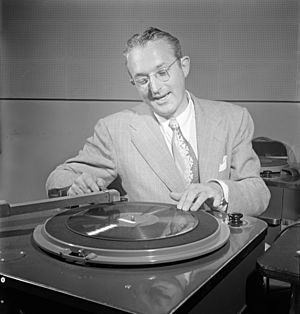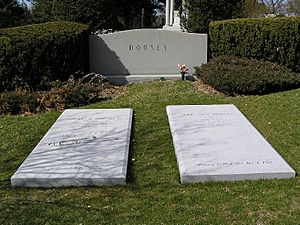Tommy Dorsey facts for kids
Quick facts for kids
Tommy Dorsey
|
|
|---|---|

Dorsey in 1947
|
|
| Background information | |
| Birth name | Thomas Francis Dorsey Jr. |
| Born | November 19, 1905 Shenandoah, Pennsylvania, U.S. |
| Died | November 26, 1956 (aged 51) Greenwich, Connecticut, U.S. |
| Genres | |
| Occupation(s) |
|
| Instruments |
|
| Years active | 1921–1956 |
| Labels |
|
| Associated acts |
|
Thomas Francis Dorsey Jr. (born November 19, 1905 – died November 26, 1956) was a famous American jazz trombonist, composer, and bandleader. He was a big star during the "big band era." People called him the "Sentimental Gentleman of Swing" because of how smoothly he played the trombone. His special theme song was "I'm Getting Sentimental Over You." Other musicians greatly admired his amazing skill on the trombone. He was the younger brother of another famous bandleader, Jimmy Dorsey. After some disagreements with his brother in the mid-1930s, Tommy Dorsey started his own very successful band. He is remembered for many popular songs like "Opus One", "Song of India", and his biggest hit, "I'll Never Smile Again".
Contents
Early life and career beginnings
Thomas Francis Dorsey Jr. was born in Mahanoy Plane, Pennsylvania. He was the second of four children. His father, Thomas Francis Dorsey Sr., was also a bandleader. Tommy and his older brother, Jimmy, became known as the Dorsey Brothers. Tommy first learned to play the trumpet from his father, but he later switched to the trombone.
When Tommy was 15, Jimmy suggested he join the Scranton Sirens, a local band. Tommy and Jimmy played together in many bands, including those led by Rudy Vallee and Paul Whiteman. In 1929, the Dorsey Brothers had their first hit song called "Coquette."
In 1934, the Dorsey Brothers band signed with Decca Records and had a hit with "I Believe in Miracles." Glenn Miller, another famous musician, played in their orchestra during 1934 and 1935. He even wrote some songs for the band. In 1935, Tommy Dorsey decided to leave the Dorsey Brothers Orchestra to start his own band. His new orchestra became known for playing beautiful ballads, often with singers like Jack Leonard and Frank Sinatra.
Leading his own band
Tommy Dorsey's band became popular very quickly. Their first hit with RCA Victor was "On Treasure Island" in 1935. At first, Dorsey played a mix of "hot jazz" and his smooth style. Later, his manager encouraged him to focus more on pop and vocal songs. Dorsey still kept a small Dixieland group called the Clambake Seven, which played during his performances.
By 1939, Dorsey wanted his band to have more of a jazz feel. He hired Sy Oliver, a talented arranger, from another band. Sy Oliver created famous arrangements like "On the Sunny Side of the Street" and "T.D.'s Boogie Woogie." He also wrote two of the band's well-known instrumental songs, "Well, Git It" and "Opus One".
In 1940, Dorsey hired a young singer named Frank Sinatra from another band. Sinatra recorded eighty songs with the Dorsey band between 1940 and 1942. These included hits like "In the Blue of Evening" and "This Love of Mine". Sinatra became very famous while singing with Dorsey's band. He even said he learned how to control his breath by watching Dorsey play the trombone.
Many talented musicians and arrangers worked with Tommy Dorsey. These included trumpeters like Ziggy Elman and Doc Severinsen, pianists like Jess Stacy, and drummers like Buddy Rich and Louie Bellson. Famous singers who performed with Dorsey's band included Frank Sinatra, Jo Stafford with the Pied Pipers, Dick Haymes, and Connie Haines.
In 1944, Dorsey hired a vocal group called the Sentimentalists. He also worked with singer Connee Boswell. After Gene Krupa left his own band, Dorsey hired him as a drummer. In 1942, Dorsey even hired the string section from Artie Shaw's band, which added a unique sound to his music.
Tommy Dorsey also had a good business sense. He helped Glenn Miller start his band in 1938. Dorsey also owned two music publishing companies, Sun and Embassy. He even opened his own ballroom, the Casino Gardens, around 1944.
Tommy Dorsey decided to stop his orchestra at the end of 1946. Many big bands broke up after World War II because music styles were changing. However, Dorsey's album "All Time Hits" became very popular in 1947. Also, his song "How Are Things in Glocca Morra?" was a top hit. Because of this success, Dorsey was able to start his big band again in 1947.
Around this time, Tommy and his brother Jimmy started getting along better. A movie about their lives, The Fabulous Dorseys, came out in 1947. It showed how the brothers began their careers and how their bands became famous.
In the early 1950s, Tommy Dorsey moved his band to Decca Records. In 1953, Jimmy Dorsey broke up his own band, and Tommy invited him to join his orchestra. The brothers then focused on television. They appeared on Jackie Gleason's TV show in 1953 and later had their own show called Stage Show from 1954 to 1956. In January 1956, the Dorsey brothers made history by introducing Elvis Presley on national television. Elvis, who was a regional country singer at the time, made six appearances on Stage Show.
Personal life
Tommy Dorsey was married three times. He first married Mildred "Toots" Kraft in 1922 when he was 17. They had two children, Patricia and Thomas F. Dorsey III. They later divorced.
His second wife was actress Patricia Dane, whom he married in 1943. They divorced in 1947.
Finally, Dorsey married Jane Carl New in 1948. She was a dancer. Tommy and Jane Dorsey had two children, Catherine Susan and Steve.
Death and legacy
Tommy Dorsey passed away on November 26, 1956, at his home in Greenwich, Connecticut, shortly after his 51st birthday. He died in his sleep.
After Tommy's death, his brother Jimmy Dorsey led the band until he passed away the following year. Then, trombonist Warren Covington took over as leader of the "Tommy Dorsey Orchestra." They had a hit song called "Tea for Two Cha-Cha" in 1958. Other musicians like Sam Donahue and Buddy Morrow also led the band over the years. Frank Sinatra Jr., Frank Sinatra's son, made his singing debut with the band in 1963.
Jane Dorsey, Tommy's wife, passed away in 2003. Tommy and Jane Dorsey are buried together in Kensico Cemetery in Valhalla, New York.
Number-one hits
Tommy Dorsey had an amazing number of hit songs on the Billboard charts, with 286 songs making the list! His orchestra had seventeen number-one hits in the 1930s and 1940s. Some of these include: "On Treasure Island", "The Music Goes 'Round and Around", "You", "Marie", "Satan Takes a Holiday", "The Big Apple", "Once in a While", "The Dipsy Doodle", "Our Love", "All the Things You Are", "Indian Summer", and "Dolores".
He also had two number-one hits in 1935 when he was part of the Dorsey Brothers Orchestra: "Lullaby of Broadway" and "Chasing Shadows."
His biggest hit was "I'll Never Smile Again," which featured Frank Sinatra singing. This song was number one for twelve weeks in 1940! Other popular songs with Sinatra's vocals that reached number one or the top ten included "There Are Such Things," "In the Blue of Evening," "It's Always You," and "I'll Be Seeing You."
Songs written by Tommy Dorsey
Tommy Dorsey also wrote many songs himself. Here are some of them:
- 1929: "You Can't Cheat a Cheater"
- 1932: "Three Moods"
- 1937: "The Morning After"
- 1938: "Chris and His Gang"
- 1938: "Peckin' With Penguins" (for a Porky Pig cartoon!)
- 1939: "To You"
- 1939: "This Is No Dream"
- 1939: "You Taught Me to Love Again"
- 1939: "In the Middle of a Dream"
- 1939: "Night in Sudan"
- 1939: "Dark Laughter"
- 1945: "Fluid Jive"
- 1946: "Nip and Tuck"
- 1947: "Trombonology"
He also wrote songs with Fred Norman, including "Bunch of Beats," "Mid Riff," and "Candied Yams."
Awards and honors
Tommy Dorsey received many honors for his music. In 1982, his 1940 recording of "I'll Never Smile Again" was added to the Grammy Hall of Fame. This special award honors recordings that are at least 25 years old and are very important historically or for their quality.
His theme song, "I'm Getting Sentimental Over You", was also inducted into the Grammy Hall of Fame in 1998. The same year, his recording of "Marie" (written by Irving Berlin) also received this honor.
In 1996, the U.S. Postal Service created a special postage stamp to honor both Tommy Dorsey and Jimmy Dorsey.
| Tommy Dorsey: Grammy Hall of Fame Awards | |||||
| Year recorded | Title | Genre | Label | Year inducted | Notes |
|---|---|---|---|---|---|
| 1940 | "I'll Never Smile Again" | Jazz (single) | Victor | 1982 | |
| 1936 | "I'm Getting Sentimental Over You" | Jazz (single) | Victor | 1998 | |
| 1937 | "Marie" | Jazz (single) | Victor | 1998 | |
Discography
Here are some of the albums and recordings by Tommy Dorsey:
- Up Swing (Victor Records, 1944)
- Tommy Dorsey Plays Tchaikovsky Melodies for Dancing (RCA Victor, 1947)
- Tommy Dorsey (RCA Victor, 1949)
- Tommy Dorsey Plays Cole Porter for Dancing (RCA Victor, 1950)
- Tommy Dorsey's Dixieland for Dancing (RCA Victor, 1950)
- The Later Tommy Dorsey Volume 2 (Ajaz, 1950)
- Tommy and Jimmy Dorsey with the California Ramblers (Riverside, 1955)
- That Sentimental Gentleman (RCA Victor, 1957)
- The Golden Age of the Dance Bands (Somerset, 1957)
- The Dorsey Touch (Riviera, 1959)
- Tribute to Tommy Dorsey (Broadway, 1959)
- The One And Only Tommy Dorsey (RCA Camden, 1961)
- Tommy Dorsey's Dance Party (Ace of Hearts, 1961)
- Dedicated to You (RCA Camden, 1964)
- A Man and His Trombone (Colpix, 1966)
- Here are Tommy and Jimmy Dorsey at Their Rare of All Rarest Performance Vol. 1 (Kings of Jazz, 1975)
- Tommy Dorsey On Radio/Eddie Condon's Jazz Concert (Radiola, 1975)
- Tommy Dorsey (1937 – 1941) (AMIGA, 1976)
- One Night Stand (Sandy Hook, 1976)
- Frank Sinatra & Tommy Dorsey (Durium, 1976)
- The Dorsey/Sinatra Sessions (RCA, 1982)
- The Tommy Dorsey/Frank Sinatra Radio Years and the Historic Stordahl Session (RCA, 1983)
- The End of the Big Band Era! (Sandy Hook, 1983)
- Ship Ahoy/Las Vegas Nights (Hollywood Soundstage, 1983)
- A Tribute (Star Line Productions, 1987)
- All-Time Greatest Dorsey/Sinatra Hits, Vol. 1-4 (RCA, 1988)
- Plays Sweet & Hot (Tax, 1989)
- Tommy Dorsey and His Orchestra/And His Clambake Seven (LaserLight, 1990)
- Tea for Two (Jazz Collection, 1990)
- Yes Indeed! (Bluebird/RCA, 1990)
- Music Goes Round and Round (Bluebird/RCA, 1991)
- Stop, Look and Listen (ASV/Living Era, 1994)
- Kings of Trombone (Hallmark, 1995)
- Dorsey-itis (Drive Archive, 1996)
- Saturday Afternoon at the Meadowbrook 1940 (Jazz Band, 2000)
- This Is Tommy Dorsey & His Orchestra, Vol. 1 (Collectables, 2001)
- The Early Jazz Sides 1932–1937 (Jazz Legends, 2004)
- It's D'Lovely 1947–1950 (Hep, 2004)
Filmography
Tommy Dorsey and his Orchestra appeared in several films:
- Segar Ellis and His Embassy Club Orchestra (1929)
- Alice Bolden and Her Orchestra (1929)
- Las Vegas Nights (1941)
- Ship Ahoy (1942)
- Presenting Lily Mars(1943)
- Girl Crazy (1943)
- Du Barry Was a Lady (1943)
- Broadway Rhythm (1944)
- Thrill of a Romance (1945)
- The Great Morgan (1946)
- The Fabulous Dorseys (1947)
- A Song Is Born (1948)
- Disk Jockey (1951)
See also
 In Spanish: Tommy Dorsey para niños
In Spanish: Tommy Dorsey para niños
 | George Robert Carruthers |
 | Patricia Bath |
 | Jan Ernst Matzeliger |
 | Alexander Miles |


